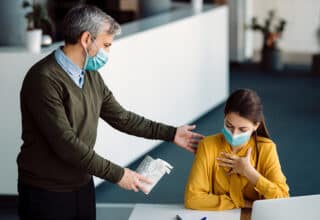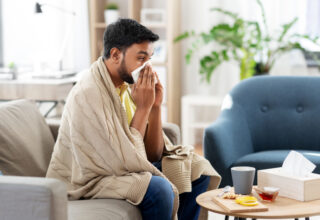We often think of food as something that nourishes and comforts us— but for some people with food allergies, a simple meal can turn into a serious health risk.
Many of us have heard someone say “I can’t eat peanuts, I’m allergic” or “I have wheat allergy, my body doesn’t tolerate it”. But have you ever thought about what being allergic to certain foods really means?
Let’s learn about food allergies, how they look like, their causes , how long they can last, and some effective tips to manage them.
What are Food Allergies?
A food allergy is when your body sees certain foods as a harmful threat—known as allergen—and reacts to them. In response to those allergens, your body releases chemicals like histamine, that cause allergy symptoms. It is usually mild but can be serious for some people.
Food allergy is different from food intolerance, which usually affects digestion and causes symptoms like bloating and tummy ache after eating the food you’re intolerant to.
What Causes Food Allergies?
Food allergy happens when your immune system reacts to certain foods— as if they’re harmful—even though they’re perfectly safe for most people.
The exact reason why some people react this way to certain foods is not clear.
But we know that there are some foods that are more likely to trigger an allergic reaction than others.
Some of the common culprits are:
- Cow’s milk
- Eggs
- Peanuts, soybeans, peas, and chickpeas
- Tree nuts like almonds, hazelnuts, walnuts, cashew, and pistachio
- Fish such as bass and cod
- Shellfish such as prawns, crabs, and lobster
- Wheat
- Sesame
What are the Symptoms of Food Allergy?
Symptoms of food allergy can show up within minutes to a couple of hours or days after eating the problematic food. These symptoms can affect any part of your body and can also affect more than one part at a time.
These symptoms can range from mild to severe ones and may include:
Mild to Moderate Symptoms:
- Itchy skin or raised rash (hives)
- Swelling of lips, face, or eyes
- Itchy mouth, throat, or ears
- Stomach ache
- Nausea or vomiting
- Diarrhea
- Sneezing or an itchy, runny, or blocked nose
- Coughing
- Noisy breathing
- Hoarseness of voice
Severe Symptoms (Anaphylaxis):
- Swelling of the tongue or throat
- Difficulty breathing or shortness of breath
- Wheezing
- Difficulty swallowing
- Skin reactions like hives and itching and flushed or pale skin
- Drop in blood pressure
- Rapid pulse
- Dizziness
- Loss of consciousness
Anaphylaxis is a medical emergency which can be life-threatening and requires immediate treatment— usually with an epinephrine injection (EpiPen) and visit to the emergency department.
How Food Allergy is Diagnosed?
If you suspect a food allergy, don’t self-diagnose. Consult with your doctor. They’ll ask you questions about your symptoms and may order tests like:
- Skin prick test— a drop of liquid containing the food you may be allergic to is put on your skin to see if it reacts
- Blood tests
- A special test in which you’re asked to avoid the food you might be allergic to, and see if the symptoms get better
These tests will help your doctor figure out the cause of your symptoms.
You might also be asked by your doctor to keep a diary of what you eat and symptoms you experience to identify the potential triggers.
Treatment for a Food Allergy:
Right now, there is no cure for food allergy. Although, there are things that can help you manage your symptoms.
The first way is to avoid the allergen. Stay away from the foods that trigger your reaction, even if it’s just a small ingredient in a dish.
You might also be prescribed medicines to help manage your symptoms or respond to emergencies, such as:
- Antihistamines for mild reactions
- Adrenaline auto-injectors like an EpiPen for severe reactions
Your allergy specialist will provide a personalised management plan for you, outlining how to stay safe and handle any allergic reaction.
Living with Food Allergies: Tips for Daily Life
Living with food allergies can be overwhelming especially in social gatherings or when you’re dining out.
Here are a few tips for you to stay safe:
- Read food labels carefully to make sure they don’t have any ingredient that you’re allergic to
- Ask questions when eating out—about your food’s ingredients and preparation
- Make sure that the food you’re allergic to doesn’t touch your regular food
- Educate your family and friends about your allergy and how to help during a reaction
- Carry two adrenaline auto-injectors (like an EpiPen) with you all the time, if you need them
How Long Does a Mild or Severe Food Allergy Reaction Last?
If you have a food allergy , symptoms can show up within just a few minutes after eating the trigger food— but in some cases, it might take up to two hours for the symptoms to appear.
How long the symptoms last depends on the severity of your allergy, amount of the trigger food you ate, and how quickly the treatment was given.
Mild symptoms— such as itching, hives, or stomach upset— usually fade away within a few hours. If your reaction stays mild and responds well to antihistamines, you’ll probably feel better by the end of the day.
That said, everyone reacts differently. Some people may continue to feel off— like dealing with fatigue or lingering skin irritation— for a day or two afterwards.
Severe allergic reactions (anaphylaxis) need urgent medical care. Even if you start feeling better after using an EpiPen, your symptoms might return in what’s called a biphasic reaction— sometimes up to 12 hours after the first wave. That’s why you should go to the hospital even after you start feeling better.
Final Thoughts:
Living with food allergies can definitely be challenging. But with some awareness, planning, and right support, it gets a lot easier to manage. Learning about your triggers, reading food labels carefully, and being prepared for emergency situations can give you peace of mind and help you live more confidently. It’s all about staying informed and taking small steps to stay safe everyday.








